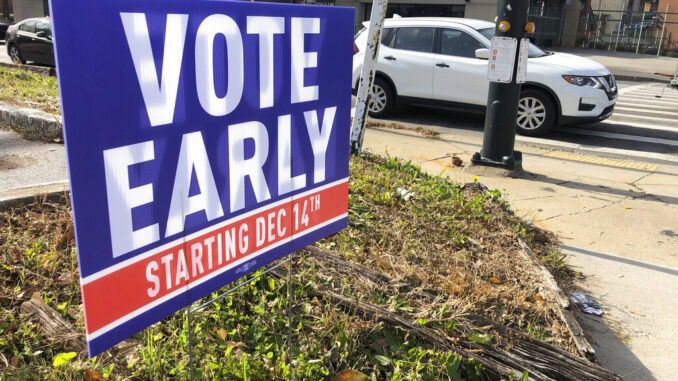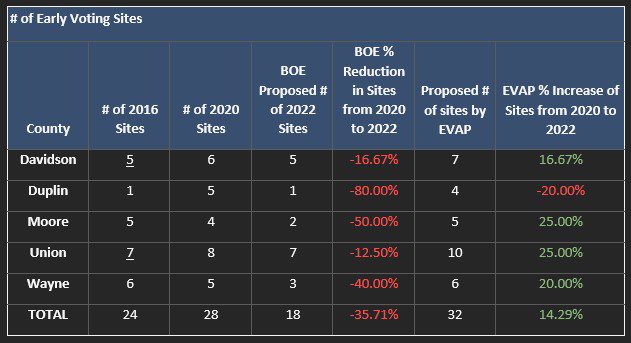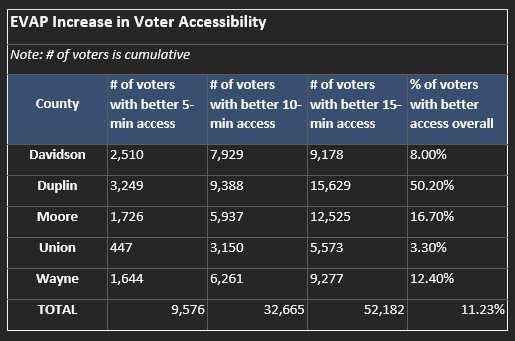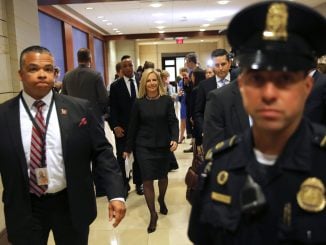
RALEIGH — A nonprofit called Taxpayers for Honest Elections has launched the “Equal Voting Access Project,” which is seeking to improve voters’ opportunities to cast ballots during absentee one-stop voting in North Carolina.
Taxpayers for Honest Elections (TFHE) is a 501(c)4 nonprofit organization that describes itself as being “organized for the sole purpose of promoting social welfare by advocating for policies that promote free elections in North Carolina.”
“Our goal is to ensure that all North Carolinians get a fair shake and have meaningful access to cast a ballot regardless of where they live, including during early voting,” said a spokesperson for the group.
Through TFHE’s Equal Voting Access Project (EVAP), the organization had identified several counties where they believe the N.C. State Board of Elections (NCSBE) needs to expand early voting access.
State law requires that in approving county early voting plans, the NCSBE must ensure its early voting plan provides “adequate coverage” to eligible voters in each county and that plan doesn’t favor any political party, race, or candidate.
Through an analysis of data and mapping, EVAP identified five pilot counties to examine early voting access; Davidson, Duplin, Moore, Union, and Wayne.
“In analyzing just these five pilot counties, it becomes clear that not all voters have been provided the same opportunity to participate in our democratic process,” they said. “The State Board has a duty to correct that disparity.”
According to that analysis, all five of the counties saw an increase in early voting from 2016 to 2020. TFHE attributes the rise was due to both an increased number of sites and overall early voting hours in each of those counties.
TFHE speculates the increase in sites may have been partly due to the NCSBE’s emergency order in 2020 directing county boards of elections to have at least one site for every 20,000 voters in the county.
However, when that order was issued, some argued that it was discriminatory to rural voters because it likely would lead to an increase in sites in urban counties but would not necessarily have the same outcome for rural voter access.
Jumping forward to the upcoming 2022 elections this fall, all five pilot counties identified by TFHE are now looking to reduce the number of early voting sites and the number of hours offered despite increased early voting in those counties in 2020 compared to 2016.

TFHE offered an example involving Duplin County.
In 2016, Duplin County had just one early voting site open for 143 hours versus five early voting sites across the county that were collectively open for 842 hours during 2020.
Having more sites open for more hours resulted in a 38.41% increase in early votes cast in Duplin County from 2016 to 2020, according to TFHE.
For the upcoming 2022 General Election, the Duplin County Board of Elections is proposing the county go back to just one early voting site. Additionally, the site’s hours would drop to 149 hours; an 82.3% reduction over 2020.
TFHE conducted an analysis of the Duplin board’s plan showing the use of only one site would result in a marked lack of county-wide access and with only 1% of the county’s registered voters being within a 5-minute drive of a voting site, 5.6% within a 10-minute drive, and 21.1% within a 15-minute drive.
An alternative plan submitted to the NCSBE by TFHE improves the percentages for more than 50% of the registered voters Duplin County. TFHE’s plan increases the percentage of voters within a 5-minute drive of a site to 11.4%, 36.8% within a 10-minute drive, and 71.3% within a 15-minute drive.
TFHE says their data shows that adoption of their alternative plans for the five pilot counties would improve early voting access for over 50,000 North Carolina voters.

Tomorrow, on Sept. 13, the NCSBE will meet to consider “non-unanimous plans” for one-stop early voting that have been submitted by various counties. Two of TFHE’s pilot counties, Davidson and Union, are on that list for consideration.
The group also included a recent letter sent to the NCSBE about that duty.
“During tomorrow’s meeting, we plan to advocate for the State Board to fix the inequalities and legal deficiencies present in the five counties included in the inaugural year of the Equal Voting Access Project,” TFHE’s spokesperson said. “The citizens in this State deserve an equal opportunity to cast their votes regardless of their zip code.”
The group argues the NCSBE has increased the number of early voting sites in the recent past based on a number of the same arguments TFHE is making.
One example cited by TFHE comes from the 2021 municipal election where the NCSBE board members unanimously approved an early voting plan giving Durham County an additional site after consideration of “whether the [BOE majority’s] plan as a whole disproportionately favors any party, racial, or ethnic group, or candidate.”
Similarly, the NCSBE doubled the number of early voting sites to address concerns that had been raised during a 2022 runoff election held in Franklin County.



